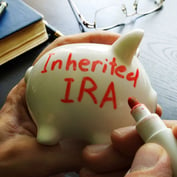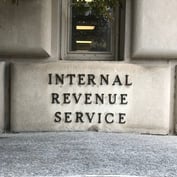When it comes to income tax, much of President Joe Biden’s Build Back Better plan is comparable to stuffing lumps of coal into taxpayers’ Christmas stockings, according to James A. Cox III, managing partner of Harris Financial Group.
For example, here’s a provision that would go into effect immediately: “You [can no longer] create entities and slide money through an S corp to avoid the 3.8% [Medicare surtax]. You can’t S corp your way out of [it],” says Cox in a recent interview.
He also explains his views on the expansion of the wash-sale rule to cover all assets and says its “bye-bye to backdoor Roth conversions” and to a rule that would cap IRA accounts at $10 million.
A Wall Street Journal expert panelist, Jamie Cox, 46, has keen insight into issues of the economy and financial regulation, about which he regularly engages in policy calls and meetings with legislators.
In the interview, he contends that there’s “a tax bomb brewing” because “an enormous number” of taxpayers are receiving Advance Child Tax Credit payments to which they’re not entitled.
“When they file their taxes,” he says, “there’ll be a lot of surprises.”
Cox launched his Richmond, Virginia-based LPL Financial practice with two partners in 2006 after a decade of working as a financial advisor. The group has about $900 million in assets under management, and its clients have included Philip Morris, Progress Energy and Verizon.
ThinkAdvisor interviewed Cox on Nov. 17. He was speaking by phone from his home in Midlothian, Va.
Addressing rising inflation, he opined, “Central banks have this big task ahead of them in the next six to nine months to thread the needle between watching the pandemic-related inflation pressure abate and not allowing a labor shortage to precipitate real inflation.”
Here are highlights of our conversation:
THINKADVISOR: What should advisors know about Advance Child Tax Credit payments, which, in President Biden’s American Rescue Plan, were expanded in 2021 and end this month?
JAMIE COX: There’s a little bit of a tax bomb brewing: An enormous number of taxpayers are receiving Child Tax Credit payments who don’t qualify for them [income exceeds limit].
The IRS doesn’t have good information on which to base these payments. A lot of people receiving them think it’s free money. It’s not.
When they file their taxes, the tax software will recapture any payments that were not supposed to come to them. So there’ll be a lot of surprises. It’s a big problem.
What should financial advisors know about Biden’s Build Back Better plan regarding taxes?
This is a biggie: [Changes to] the 3.8% net investment income tax — NIIT — [on capital gains, dividends, etc.; aka the Medicare surtax].
If your income exceeds a certain threshold — it varies every year — then you have [a] 3.8% Medicare surtax.
In the 2017 Tax Cuts and Jobs Act, there were changes that basically allowed some taxpayers to avoid that.
But The Build Back Better plan changes the definition and includes income that’s derived from a trader business.
So you can’t S Corp your way out of the 3.8%. In other words, you can’t create entities and slide money through an S Corp to avoid the 3.8%. This goes into effect immediately.
What else is concerning about the Biden plan in connection with taxes?
The wash-sale rule is being expanded to apply to all assets, including cryptocurrencies. So it will start to apply to digital assets and commodities, which it did not in the past.
The wash-sale rule says that you can’t sell an asset [at a loss] and then turn around and buy it back within 30 days because then you’re simply trying to collect the tax break on the loss.
What other tax changes are important to know about?
Bye-bye to backdoor Roth conversions. That’s a tool advisors use in marketing and to help taxpayers who otherwise are ineligible for big Roth contributions. That loophole is going to be closed.
Like many of the provisions of the Build Back Better plan, this provision, thankfully, won’t be implemented until 2031 [for pretax assets; after-tax conversions, 2021].
So if you want to get a backdoor Roth conversion in, you have a decade. After that — game over.
Please discuss what Biden’s plan says about IRA accounts that have $10 million in contributions.
If you’re a high-income taxpayer — Build Back Better says that’s income of more than $400,000 for single filers and more than $450,000 for joint filers — you’re prohibited from making contributions to IRAs of any type if they would cause the account to exceed or further exceed $10 million.
So it effectively caps IRA values at a certain level.
The distribution would be 50% of the amount by which the value exceeded $10 million in the prior year.









 December 08, 2021 at 12:33 PM
December 08, 2021 at 12:33 PM








